- Home
- James A. Michener
The Bridge at Andau Page 11
The Bridge at Andau Read online
Page 11
Tibor Donath was a country boy. He was born in 1925 in a small village near the Russian border. Unfortunately, he was an unpleasant-looking child with washed-out blond hair, weak eyes and a prominent chin. His parents were distressed when he did not do well in school, even though in the protection of his home he showed a quick ability to learn. The priest assured the Donaths that their son would “grow into a man” when he became interested in games.
This never happened, partly because Tibor remained underweight and gawky, partly because the other boys did not like him. He was able to withstand these disappointments, but in late adolescence he discovered a much crueler fact: girls did not like him either. Again the priest said, “When he’s older, and his complexion clears, everything will be all right.”
But with Tibor Donath things never were to be all right. In 1943, when all his friends were called into service, he was rejected as being badly underweight. That was what the doctor said, but among the real reasons was a strong suspicion that the boy was not well balanced. Proof of this came when, in 1944 under the German occupation, he formed a lasting attachment to a German lieutenant, who was shortly thereafter killed on the Russian front.
With the coming of peace Donath, now twenty years old, faced numerous difficult decisions. He could not find a job. He could not find a girl. And he could not find any sense of security or meaning in an aimless life of sitting at home while his mother lectured him. Once he said, “You know what I’m going to do? I’m going to Russia!” But his mother laughed at him. Then he proposed going to Germany and living with the family of his dead lieutenant.
Finally he found a niche, not an important one and not one which paid him the money he felt he needed. But it was a substantial niche, nevertheless, and gave him for the first time a sense of accomplishment. He achieved all this by joining the communist party.
His first jobs were unimportant, for the smart top party men recognized him instantly as poor material, but they did allow him to participate in supervising life in his own small village, and this was for Tibor Donath a great delight. He could now speak up to boys who had abused him and walk with girls who had ignored him. He found that his new position afforded many petty ways of obtaining small personal revenges. For example, he informed the communist party leader that one of his boyhood companions was probably a fascist, and when he saw this boy four months later, he observed with relish that his former enemy was much subdued.
It was after he had provided the party police with several such tips, some of which turned out to be accurate, that Tibor Donath, now a little heavier at age twenty-four but still with a bad complexion, was casually approached by a visitor from Budapest.
“They tell me you’d make a good special policeman,” the stranger said.
“I never thought of it,” Donath replied.
“You’d have a uniform, important duties,” the man explained, but Tibor noticed that he wore civilian clothes.
“Could I work some place else?” Donath asked.
“Possibly,” the stranger replied. And that was all Donath heard about special police duty for nearly six months. Then suddenly, in late 1949, he was ordered to report for immediate training to a barracks in central Hungary. Here he met a group of good-looking, tough, able young men, most of them, like him, from rural districts. Their officers, however, were from Budapest.
His lessons at the barracks were simple and direct. Said the instructor, “The way to break up a riot is to use guns.” He taught them how to shoot, how to drive military vehicles, how to repair armored cars and how to fight if an assailant attacked unexpectedly in the dark. “There are enemies everywhere,” the instructor warned.
At the end of three weeks, the same stranger who had visited Donath in his village appeared in camp, wearing polished boots, flared trousers and a crisp khaki uniform with blue metal decorations. He was attended by several men about Donath’s age, who were also in uniform, but with fewer decorations. “Men,” the visitor said, “on you Hungary is going to build its greatest defense. You are to be national heroes, watching day and night. You may have to engage in frequent battles. Your first task is to seal the frontiers hermetically and transform our border regions into real fortresses.”
From then on Donath’s training increased in intensity, and soon he was given the khaki uniform of the border guard, with flaring pants, polished boots and green metal decorations. “We will make it very difficult for enemies to get into Hungary,” the eager young men pledged.
But when Tibor and his class were sent to the frontier they found, somewhat to their astonishment, that they were not concerned about people trying to get into the country. Their job was solely to hunt down Hungarians who were endeavoring to escape. For example, Donath was sent to the Yugoslav border, where one might have expected Tito bandits and murderers to try forcing their way into Hungary, but instead he found hundreds of Hungarians fleeing into Yugoslavia.
“We’ll soon put a stop to that,” Donath’s commander said sternly.
On the first night Tibor and his men simply shot any would-be escapees, and after word of this policy circulated through the countryside the stream of refugees diminished. Then barriers were set up and a band of border land thirty yards wide was plowed up so that footmarks could be tracked. Next a barbed-wire fence was constructed at the most likely points of escape. But the commander was not yet satisfied, for he gave Donath a special job which occupied him for three months.
Throughout the plowed strip, Tibor carefully planted mines that would explode if touched by an unwary traveler seeking escape. Sometimes he wired eight or ten of the mines together, so that if one escapee accidentally tripped one of the mines, all the others would explode and catch additional members of the fleeing party.
At strategic points wooden watchtowers more than thirty feet high were erected, with solid bases for heavy machine guns and powerful searchlights which scanned the escape routes all night, every night of the year.
In spite of these precautions, some Hungarians nevertheless managed to slip through the lines and this infuriated the heads of the special police in Budapest. A top officer inspected the frontier and told the guards, “These enemies of the state are inhuman. They catch cats, put them in bags, and carry them to the edge of the mine fields. They release them there and the cats scamper into the mines. They’re blown to bits. Then the enemies of the state creep through unharmed. This has got to be stopped.”
So a standard order was passed: “If you hear any cats, rake the area with machine guns.” This tactic often succeeded in either killing or wounding fugitives in places where no one would otherwise have suspected them, and Donath found real joy in tracking down with dogs some crippled enemy who was attempting to drag a wounded body across the line. Tibor never asked himself, “Why do we never have anyone trying to get into Hungary? Why is it always out?”
When Tibor caught a wounded man, it was his trick to jam the butt of his rifle into the man’s stomach, double him up with pain, then strike him with all the weight of his right fist in the face. He would march the captured man, who might be bleeding from gunfire, back to the area headquarters, where he and several other men in green insignia would begin their questioning of the prisoner.
Each of the men in green had some special way of making prisoners talk, and often by beatings, nail pullings, smashing rifle butts onto insteps and other tortures, they forced a single escapee to tell them about others in the area, and when these were caught, they could be beaten and bullied into betraying still others.
“Never stop trying to uncover the whole escape apparatus,” Donath’s superiors had ordered, and he became so adept at squeezing out of prisoners their last hidden secrets that he was marked for special promotion to a better job in Budapest. When news of his good luck reached him on the border, he was about to set forth on night patrol with his team of dogs, and as he walked through the starry night, he had occasion to reflect upon his good fortune.
“It’ll be good to get a
way from this shooting business,” he mused. “I don’t mind shooting some man who is trying to escape just punishment, like real enemies of the government. But so many of these people have been women.”
He thought particularly of one husband and wife he had shot down some months before. He could not forget them because they resembled in many ways an average farm couple from his own village. The woman, given a few years, could have been his own mother, and after their bodies were dragged in from the mine fields, he had spent some time speculating on what crimes they had committed against the government. It never occurred to him that they might be what they appeared to be: two farm people who simply wanted to leave communism.
He could not imagine anyone wishing to leave Hungary. “The fields are so perfect in early summer,” he thought. “And Budapest is such a magnificent city, with the Danube, and the big restaurants and the people.”
In the cool night air, with the stars of his homeland over him, he contemplated the kind of job he might get. “I know I have a good record,” he reflected. “The captain said so, and so did the other men.”
Dreaming of the good things to which he felt he was now entitled, he dared to propose for himself specific jobs. “What I’d like,” he said softly, “would be a job driving a big automobile. I’d drive it all around Budapest and sometimes take important people down to Lake Balaton.” He spent some time imagining himself at the wheel of his big car, but it seemed so remote that he began to consider other possibilities: “Maybe a good, clean job keeping records somewhere. I like things to be in order and I’d be good keeping records.”
His dogs howled at some unseen object in the mine fields, but on this night Tibor Donath was in an expansive mood, and he did not stop to shoot at any vague or imagined figures. “I’d like to get away from the shooting part,” he told himself again. “And beating people up. I’ve proved that I’m as tough as any of the men. Now I’d like … well, maybe driving a big car.” And he spent the rest of that starry night dreaming of a young man in a handsome uniform, whipping around the boulevards of Budapest.
But instead of driving a car, Tibor Donath was put to work in a job which he did not particularly want, but for which, as events proved, he was admirably suited. One block in from the Danube, on the Buda side, ran Fo Street, the main thoroughfare of the right bank, and on its handsome flank, where the Kossuth Bridge crossed from Pest, stood the prison headquarters of the AVO. It was housed in a sprawling complex of buildings whose five-story façade was nearly four hundred yards long. The first two stories were heavily barred, giving it the appearance of a prison; but it was another feature, not visible from the street, which made this building particularly attractive for the purpose to which it had been put. It had two deep cellars.
It was in the upper of these cellars that Tibor Donath, exchanging the green markings of the border guard for the more important blue insignia of the true AVO man, reported for work. Hiding his disappointment, he went down into the cellar.
“Your duty is to protect the communist government of Hungary from its fascist, capitalist, reactionary enemies,” he was told. In a solemn ritual he swore allegiance to the communist leaders of Hungary and then listened in a kind of stupefied amazement as his superiors told him of the many enemies who were daily operating in Budapest. His new job was obviously more important than his last.
“But we shall stamp the enemies out,” his officer shouted. “It is our job to track down every one of them. You men have been promoted from the border guards because you have shown that you know how to do this job.”
At first Tibor Donath had the naïve idea that he was going to prowl the streets of Budapest searching for enemies of the state, but he quickly learned that lesser AVO men were doing that, and that his job was to accept these enemies when they were brought to his cellar on Fo Street. His job was to exact confessions.
But again he was somewhat disappointed, for interrogations were not entrusted to him. “You’re too dumb to outwit a real enemy,” his superior told him bluntly. “You get the prisoners in shape for the experts to talk to.” These experts were older men, often not in official AVO uniforms, but extremely intelligent. Donath marveled at the skillful way in which they were able to lead prisoners into important confessions.
His job, on the other hand, was to accept prisoners as they came in off the street and to see to it that they were willing to talk by the time the experts got to them. His procedure was direct. When a new prisoner in Tibor’s cellar arrived, frightened and uncertain of his future, Donath found it effective to explain to the man in absolutely unqualified phrases that he was beyond all hope of rescue. “No judge can reach you down here,” Tibor would say coldly. “Your family won’t know where you are. We definitely will not let you correspond with anybody for at least a year. Nobody but me can say how long you will stay here, and I don’t care if you stay here till you die. I can beat you, starve you, torture you till you’re senseless, and nobody will hear you cry or ever know what I’ve done. I want just one thing from you. Information. But before I have the inspector ask you for any, I’ll soften you up for him first.”
Always when Tibor said this, the prisoner would cringe, as if he were to be beaten, but that was not the plan. Tibor led the man to a solitary cell just big enough to hold a cot; it had no windows, no water, a steel door with peep holes, and one brilliant light that was never turned off.
“You stay here alone,” Tibor snarled. “You sleep on your back, no other way. You keep your hands always flat on the blanket, no other way. And if your back is turned to the door at any time, the guard will shoot.” Prisoners were allowed no shoelaces, no belt, no tie. “If you die in here,” Tibor explained, “we’ll do it.”
The softening-up period had been devised by earlier guards and had been found almost miraculously effective. It consisted first in breaking down any sense of time a man might be trying to maintain. Sometimes a day would be nineteen hours long, the next one fourteen, then one of thirty-six, then a night of three hours. And always the flaming light burned in the eyes. When time had been destroyed, the rest came easily.
After thirty or forty days of this, the prisoner would be moved into a cell with the same inescapable light but with no room either to sit or to sleep. He would be kept here without food for three days, going to the toilet as he crouched and then standing in the excrement. Then, when he was starving, he would be fed with heaps of greasy food, which would make him violently ill, and very salty food, which without water would drive him to torment.
Often he would be forced to go to the toilet in his own food dishes. This broke down many men.
At the end of this period, he would again be hauled before Tibor Donath, who would point sullenly to a line of steel-cored rubber hoses on his wall. “Pick the one you want,” Donath would mumble. Then, taking the chosen weapon, he would beat the man senseless. At such moments Tibor, who resented the inferior position in which he was still kept, became a gasping maniac, thrashing the weakened prisoner about the head, in the crotch, across the mouth. His eyes would blaze with some inner fury, and then, while he still gasped for breath, he would throw water over the fallen prisoner. When the man could get to his feet, Donath would say coldly, “Next time you’ll meet the inspector, and you better talk.”
Then he would remand the prisoner to the same routine of meaningless days, blazing lights and total humiliation. Sometimes Tibor’s merciless beatings broke bones or wrecked kidneys, but that was not his concern. If bones had been broken, they were free to mend as they wished, and on Fo Street you often saw men with arms jutting off at queer angles, for there were no doctors in the cellars. And if a prisoner died, Donath was empowered merely to close the books on him without any further questions from anyone.
But if the prisoner managed to survive the cellar and graduated into the general compound, then Tibor and his colleagues had terrifying ways of making his life unendurable. There were daily tortures, prolonged beatings, water cures and psychological press
ures that were most effective. And there was also Sunday.
Partly because Sunday was a holiday for the guards, and partly because the AVO studiously wished to defile a day still held in affectionate memory by most of the prisoners, Sunday had become a day of special terror. On that day, the guards, after lunch, would idly call out half a dozen prisoners and play games. Tibor was irritated by one of the games, since his inherent lack of strength left him at a disadvantage, but he nevertheless looked on with a kind of savage pleasure when some recalcitrant prisoner had to stand up, his hands at his sides, while a guard would exhibit his prowess by knocking him flat on the floor with a gigantic blow to the mouth. Of course, since the prisoner was forbidden to move, the guard could aim his swing from far back and be sure of landing it on the prisoner’s mouth.
On some Sundays Tibor would watch this game, and others, until he became quite excited. Then he would shout for the junior guards to bring out some especially offensive prisoner and he would begin to scream at him and then beat him over the head with the steel-cored hose. Often he would knock the man completely senseless and then kick at him until his face and head were bleeding.
It was Tibor who invented one of the cruelest Sunday punishments. The guards would bring in a dozen prisoners and stand them facing a row of bright electric lights. “Now stand on one foot!” he would command. The combination of intense light and one wavering foot brought forth unexpected reactions. A man would begin to scream, another would faint, a third would start dancing. But no matter what happened, if any prisoner made so much as a single move, all the others would be savagely beaten. Not the one who moved. He was safe. Tibor noticed that when a man on one foot would begin to faint, he would utilize every ounce of physical and moral energy at his command to save his fellow prisoners from another beating.
“There he goes!” the guards would shout. And they would beat the prisoners left standing until they all collapsed.

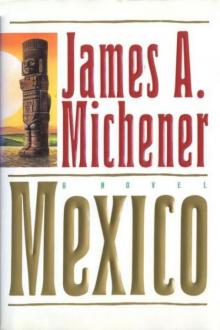 Mexico
Mexico The World Is My Home: A Memoir
The World Is My Home: A Memoir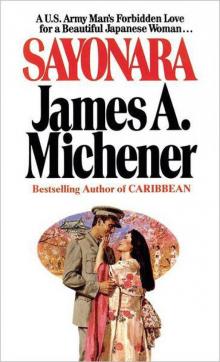 Sayonara
Sayonara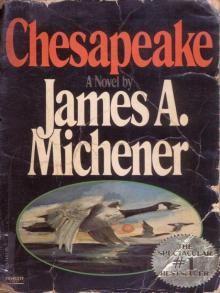 Chesapeake
Chesapeake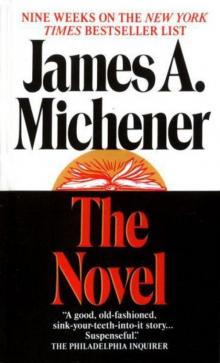 The Novel
The Novel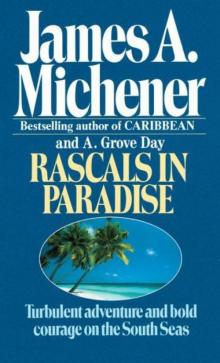 Rascals in Paradise
Rascals in Paradise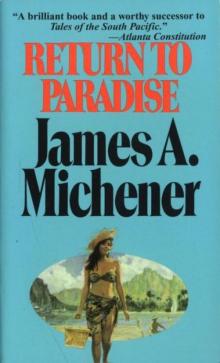 Return to Paradise
Return to Paradise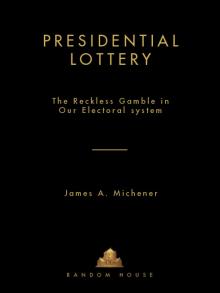 Presidential Lottery: The Reckless Gamble in Our Electoral System
Presidential Lottery: The Reckless Gamble in Our Electoral System The Source
The Source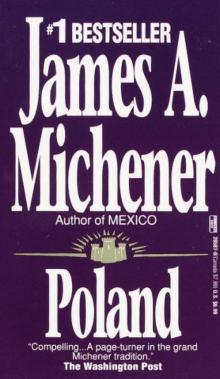 Poland
Poland Space
Space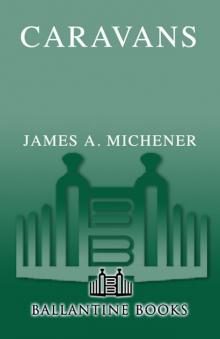 Caravans
Caravans Creatures of the Kingdom: Stories of Animals and Nature
Creatures of the Kingdom: Stories of Animals and Nature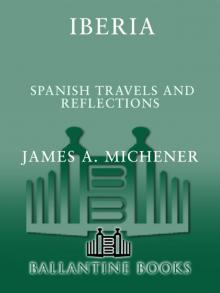 Iberia
Iberia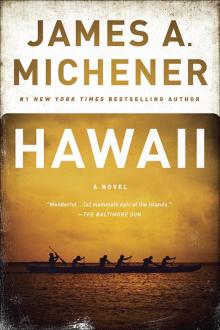 Hawaii
Hawaii The Watermen: Selections From Chesapeake
The Watermen: Selections From Chesapeake Report of the County Chairman
Report of the County Chairman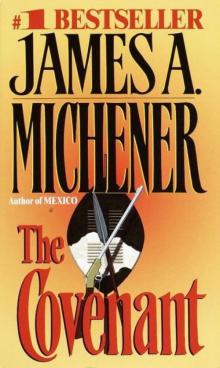 The Covenant
The Covenant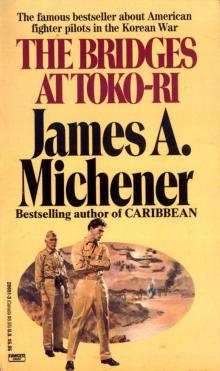 The Bridges at Toko-ri
The Bridges at Toko-ri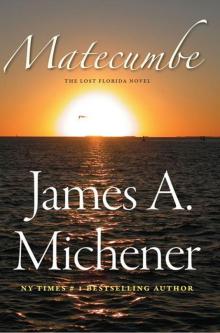 Matecumbe
Matecumbe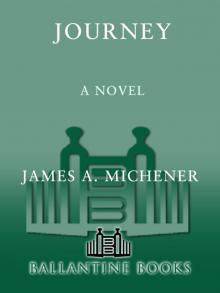 Journey: A Novel
Journey: A Novel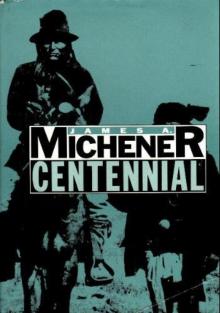 Centennial
Centennial Sports in America
Sports in America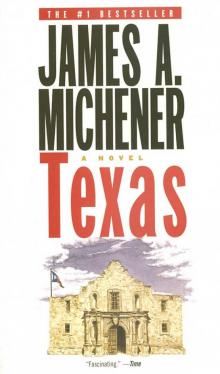 Texas
Texas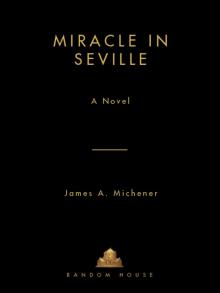 Miracle in Seville
Miracle in Seville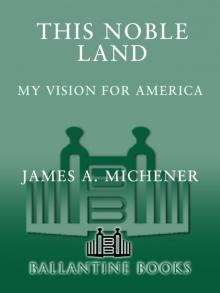 This Noble Land: My Vision for America
This Noble Land: My Vision for America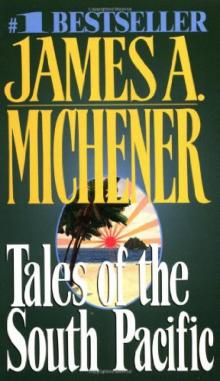 Tales of the South Pacific
Tales of the South Pacific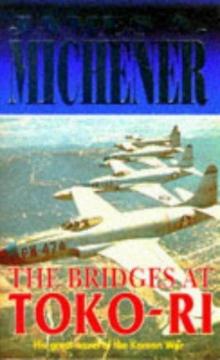 Bridges at Toko-Ri
Bridges at Toko-Ri Space: A Novel
Space: A Novel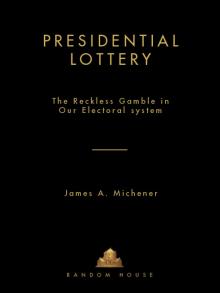 Presidential Lottery
Presidential Lottery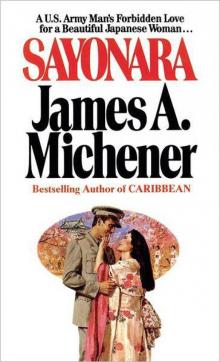 Sayonara: A Novel
Sayonara: A Novel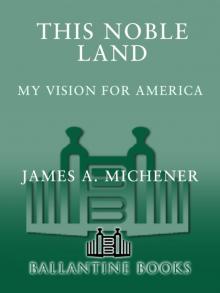 This Noble Land
This Noble Land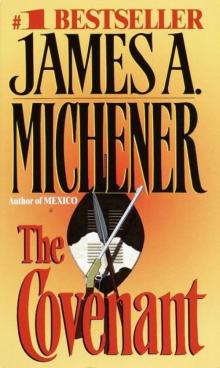 The Covenant: A Novel
The Covenant: A Novel Miracle in Seville: A Novel
Miracle in Seville: A Novel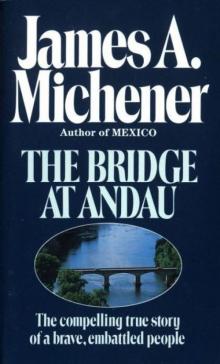 The Bridge at Andau
The Bridge at Andau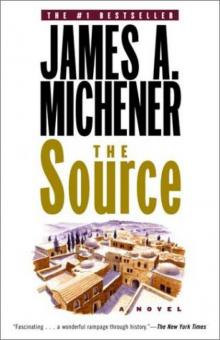 Source
Source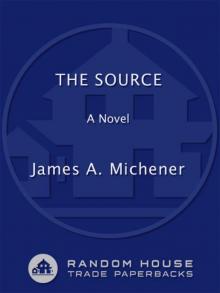 The Source: A Novel
The Source: A Novel Journey
Journey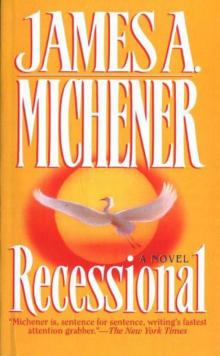 Recessional: A Novel
Recessional: A Novel Legacy: A Novel
Legacy: A Novel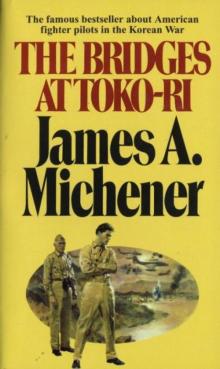 The Bridges at Toko-Ri: A Novel
The Bridges at Toko-Ri: A Novel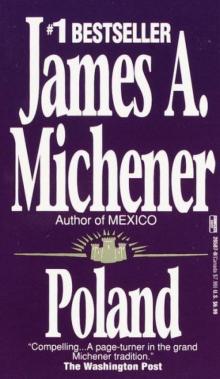 Poland: A Novel
Poland: A Novel